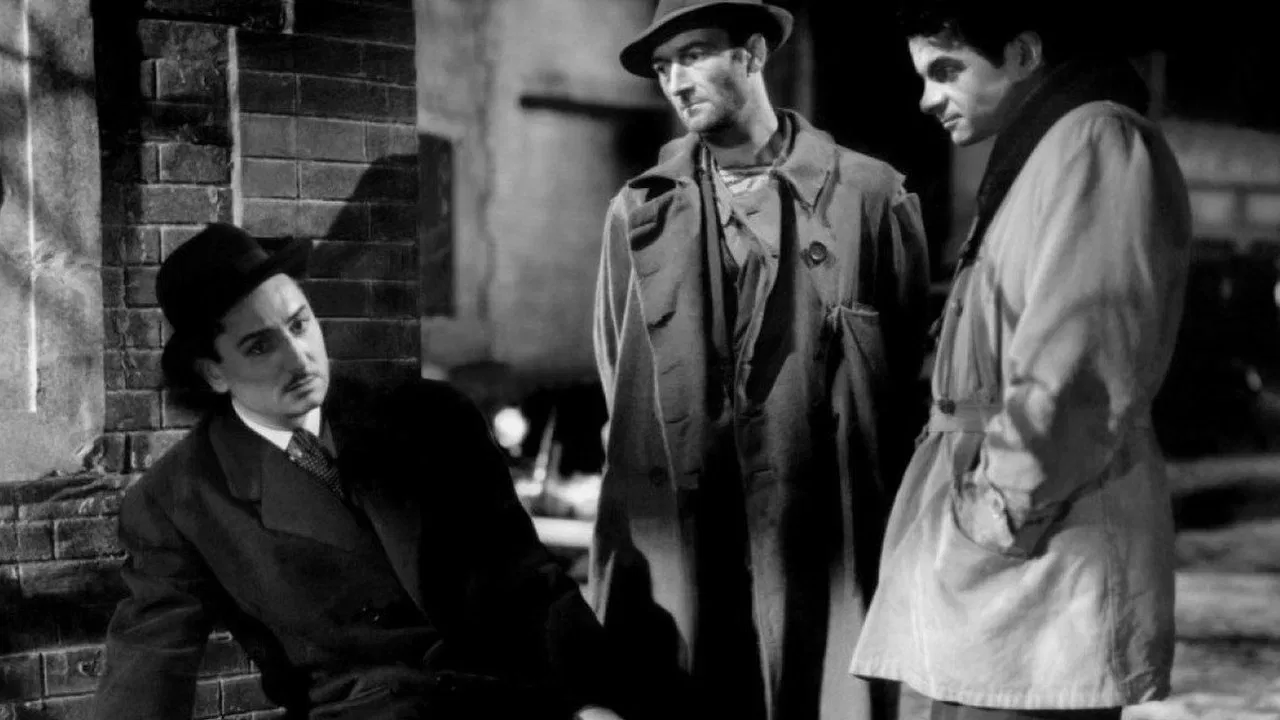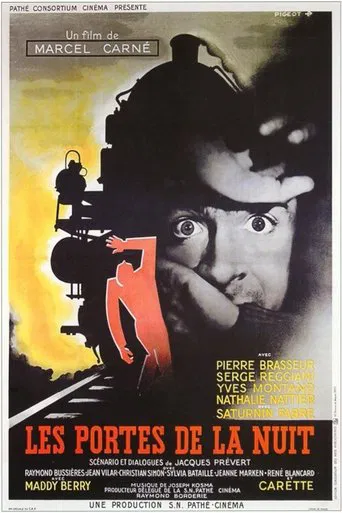Aedonerre
I gave this film a 9 out of 10, because it was exactly what I expected it to be.
ChanFamous
I wanted to like it more than I actually did... But much of the humor totally escaped me and I walked out only mildly impressed.
Yash Wade
Close shines in drama with strong language, adult themes.
Darin
One of the film's great tricks is that, for a time, you think it will go down a rabbit hole of unrealistic glorification.
Gizmo
Making my way through the films of Marcel Carné I come at last to this, which, after just watching Les Enfants du Paradis, can't help but feel somewhat lesser, and indeed the film does feel like less than the sum of its parts. There's some wonderful stretches but for it to work it needed to pull all of the strands of story together in a satisfying way by the end, and it doesn't, it just misses the mark. The pacing also drags in parts, particularly towards the end.As often with foreign language films from the past, the English subtitles are poorly translated and unclear, making the point and subtext of certain passages hard to follow.The fabric of the film is glorious, though, with a magical mood and ravishing photography. The premise of fated lovers is very nicely evoked, if not satisfactorily executed. Still very worth checking out though.
jotix100
We are in Paris. It is 1945 and Paris was already liberated, but the war still rages on. We are given a view of the city as the scene changes to a metro car where Jean Diego, a young man is riding. A poorly dressed man, opposite him keeps staring at him. As he comes over, he asks whether he is getting off at the next stop. Both exit the train, but Jean loses the bum like man. Jean is on his way to visit Claire Lecuyer, a woman whose husband Raymond, Jean believes, was killed in the conflict. To his amazement, Claire sets things straight, telling the visitor her husband Raymond is much alive, and well. A bit later, Raymond Lecuyer comes home. He is now working for the railroad, bearing in his hands the scars of the torture Raymond endured.The occasion calls for a celebration. Jean Diego takes the family to a local bistro. The man from the metro comes in wanting to play his harmonica. As Jean looks out the window, he watches a gorgeous woman outside, sitting in a car smoking. Jean is instantly smitten by the lady's beauty. She is Malou, a singer that has traveled, like Jean, all over the world. Malou, now married to a horrible man, is a local girl from the neighborhood.Malou has come to see her older father. They have been distant. Her brother Guy is a low life who ratted on people to the German invaders. He must flee. Things get complicated when Jean and Malou meet in the warehouse of her father. It is instant love for them. The lovers are doomed because Guy gets in the way. A wonderful film by Marcel Carne from 1946. Another contribution between the director and Jacques Prevert which evidently was lost for quite some time, but new audiences are receptive to Mr. Carne's films again. This is a fine example of an ambitious project which had romance mixed in with fatality. The poor man hints at what is coming, although most prefer to ignore the fate he heralds.A young Yves Montand has a good opportunity to shine in the film. He gives an honest portrayal of a decent man that gets tangled in things beyond his control. The gorgeous Nathalie Nattier makes a mysterious Malou. Jean Vilar appears as the poor man that stands for the destiny. Serge Reggiani plays Malou's brother, Guy. A young Dany Robin appears briefly.
vostf
There's more than one reason to be utterly disappointed by this movie teaming Carné & Prévert & Trauner & Kosma again so soon after Les Enfants du Paradis.Where to begin to describe this failure to follow up with the previous year's masterpiece? The characters are all wooden and no one has a story that gets the movie started. The best in my opinion is the character played by Serge Reggiani, the worst is the one played by Nathalie Nattier whose acting is horrendous. Anyway the love story between her character and Montand's is melodramatic in the worst sense. Montand is OK though but eventually he is as much at a loss as we are, trying to get through the story. As for the other characters they are quite colorful thus they get too much exposition which proves detrimental to the building up of a core narrative.Sad misfire... how could they go so far downhill? I suppose it's the classic spell of bad ideas piling up to give a very bad result. A character embodying Destiny? OK that's poetic but the rest of the story unfolds in a very serious background: post-Liberation Paris with patriots and traitors casually living side by side. Some aspects are poetic, others just dead serious and the love story in between is simply stuck in a no-man's-land, non-existent. Very sad to say with the benefit of hindsight that they fumbled everything as if they didn't know how to tell a story: a love story lost in a deck of vignettes of varying interest.Well, I'd rather think of what they could have done with the Montand character investigating in the underworld to find his fiancée or maybe escaping his fate, in line with Gabin's character in Quai des brumes. Or if they had made a dark comedy like Drôle de drame with people reuniting after the war, trying to know what each other did under German rule in order to find an upright (and innocent) new family leader to eventually hide their consciences (and ill-acquired fortunes) behind him.
writers_reign
Usually I don't comment on previous comments however misguided or uninformed they may be but in this case I must refer to the only other comment that has been posted if only to explain to our Canadian correspondent the difference between an individual song heard within a movie and a movie 'score'. The score of a given film embraces every note of background music from beginning to end credits and whilst on occasion (In 'Breakfast At Tiffany's' for example composer Hank Mancini wrote an individual song, 'Moon River', with lyrics by Johnny Mercer, which Audrey Hepburn sang at one point) an individual song may be highlighted it is erroneous to refer to that song as the 'score' of the film (to continue with the BAT illustration, Mancini's background score was, at times, lilting and some time later a second single song, 'Lovers In New York' was published, using Mancini's background music). Whilst it is true that scriptwriter Jacques Prevert's poem, Les Feuilles Mortes, set to music most memorably by long-time collaborator Joseph Kosma, IS heard (though not to completion) in the film it is not, by any stretch of the imagination, a 'score'. As it happens a second Prevert poem, Les Enfants qui s'aiment (Children Who Love) is also heard in snatches in this great movie though ironically neither is sung by Yves Montand, who went on to 'own' Les Feuilles Mortes and also recorded Les Enfants qui s'aiment unforgettably on his 'Montand Chante Prevert' album. But what of the movie itself. It started with one strike on it; Jean Gabin and Marlene Dietrich, for whom the two leading roles had been tailored by Prevert, ankled shortly before shooting commenced so Carne tapped the inexperienced (in acting) Montand and the justifiably soon forgetten Nathalie Nattier as deps. As if that weren't enough the film was packaged as the most expensive ever made in France so expectations were high. We now have to consider the climate against which it was shot and made. We're talking 1946, lots of uneasiness in the air concerning collaboration, black marketeering, etc. Prevert gives us a fantasy - Montand meets a bum on the Metro who claims he is Destiny personified and predicts that Montand will meet later that same day the most beautiful woman in the world but after one mayfly moment he will lose her again - but a fantasy laced with the realism of black marketeering, post-war austerity, hints of collaboration. It was, arguably, the wrong theme at the wrong time and the egg it laid was such that it broke up the partnership of Prevert-Carne (who had just come off 'Les Enfants du Paradis') who had invented the concept of poetic realism and given the world such gems as Le jour se leve, Quai des brumes, les visiteurs du soir, etc. Seen today it is much easier to concentrate on its strenghs and delight in the first fledgling steps towards 'Great Actor' status taken by Yves Montand. In sum: a gem. ten stars, no question.

